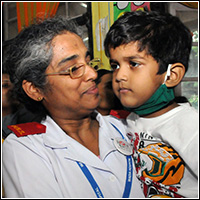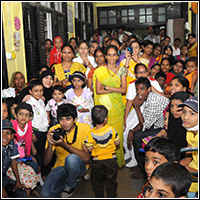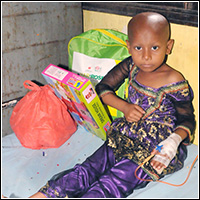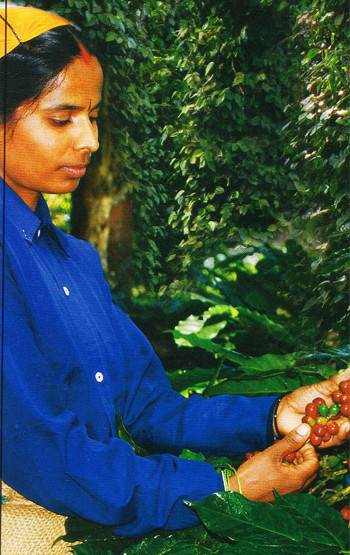
CSR initiatives taken by the Group Company.
Through the years, the human spirit has been the fulcrum of the Wadia Group’s endeavours. Beyond self servicing Corporate goals, the Wadia Group has always been driven by a community consciousness, a desire to share its prosperity with the community at large. The involvement of the Wadias in community welfare began with the magnificent obsession of Bai Jerbai Wadia, who single mindly and committedly set out to construct low cost “Baugs” or housing colonies in Bombay for lower and middle class Parsis. Between 1908 and 1956, 5 baugs were built – the Nowroz Baug, Rustom Baug, Bai Jerbai Baug, Cusrow Baug and Ness Baug. Even today, they stand testimony to the magnanimous spirit of Bai Jerbai and her sons.
The Company is responsible for the implementation of the Neville.N.Wadia higher education scholarship scheme from the year 1997/98. Children of all employees of the Group Companies pursuing higher education are eligible to obtain this scholarship. Weight age is given to children of employees who have excelled in sports. The Group also extends educational loans to employees to meet additional expenses, while the children pursue professional courses. The scholarship scheme is also extended to employees who are superannuated and to those who have been retired on medical grounds.

Health care
Health care facilities were another area close to her heart. With her inspiration, her sons’ Ness and Kusrow set about building much needed hospitals in Bombay.
Sir Ness Wadia along with his close friend Sir Mangaldas Mehta, are renowned gynaecologist, were appalled by the conditions in which the mill workers children were born. A cause soon became their crusade. What started as a few make shift rooms in a building at Parel, Bombay, soon became a large maternity home, the Nowrosjee Wadia Maternity Hospital as we know it today.
Sir Kusrow Wadia joined his brother Ness to build the Bai Jerbai Wadia hospital in memory of their mother. Today, the two hospitals have some of the best Research Institutions and the most distinguished Medical Practitioners in attendance, almost all of them Honoraries.
The generosity of the Wadias also echoes in the portals of the Wadia colleges in Pune where 11,000 students are enrolled today. Another significant contribution on the academic front is the Neville N Wadia College of Business Management and Research.
For the Wadia Group, charity has always begun at home with the welfare of its workers. In fact, one of the first housing projects for mill workers was started by the Wadia Mills. Bombay Dyeing was the first to open a Provident Fund for workers and a fore runner in establishing Family Planning Centres for its work force.
Successive generations of Wadias have demonstrated the generosity of the founding fathers, with equal enthusiasm.
The Sir Ness Wadia Foundation, a charitable trust set up in 1969 is today vibrant and throbbing. Individual Companies of the Wadia group rise to the occasion when ever a cause is taken up by the foundation, and more often when profits justify it. The Trustees have dispersed funds to a broad spectrum of causes from scholarships for the disabled to drought relief in Bombay. For instance, the aftermath of the Latur earthquake in India saw the Wadia Group rebuild an entire village and in the process, rehabilitate thousands of families.
In many ways, the human factor has been the cornerstone of the Groups’ success. Employee loyalty has always been recognised and rewarded. The coveted silver medal for 25 years of service and precious gold medallion for 40 years of commitment are cherished symbols of dedication and loyalty. In Bombay dyeing alone, over 200 silver medals are handed out each year.
Plantation
The Plantation Division of the Wadia Group is amongst the most reputed Plantations Businesses in South India. This division has been adhering to, and instrumental in formulating one of the highest standards of Welfare and Social Commitment.. In fact, some of the in-house standards set by the Corporation were incorporated when the statutory regulations were being formulated, for Plantations.
Since the focus of ‘Fair-trade’ was in line with the Vision of the Corporation, we embraced the Fair-trade Movement across our Tea Plantations in India and Tanzania. We share a Vision of Improvement in the basic living standards of our grass root level employees, who, we recognise are the biggest assets of the Corporation. We have been actively involved in the Fair-trade movement since 1995. In cooperation with Fair-trade, we work towards a common goal of achieving better social, economic and environmental conditions for our workers, and the community at large. The employees at all levels have been made conscious of their commitment to the local community & undertake both social and charitable contributions.

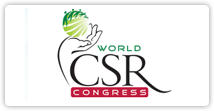 WADIA GROUP AWARDED AS THE “BEST GROUP IN CSR PRACTICES”
WADIA GROUP AWARDED AS THE “BEST GROUP IN CSR PRACTICES”